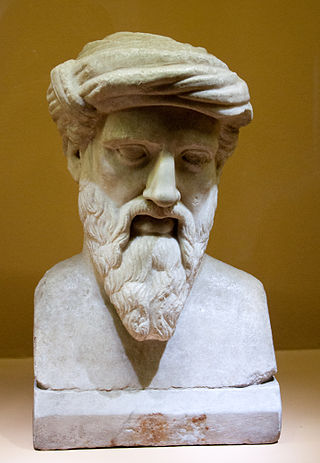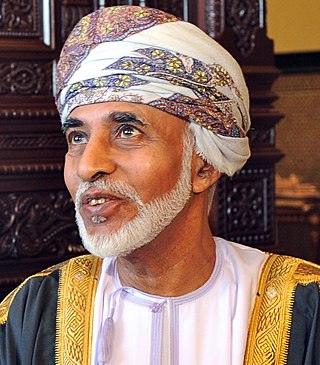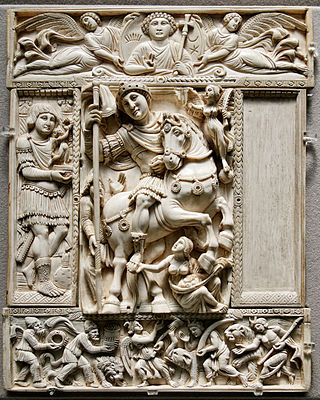Related Research Articles

Pythagoras of Samos was an ancient Ionian Greek philosopher, polymath and the eponymous founder of Pythagoreanism. His political and religious teachings were well known in Magna Graecia and influenced the philosophies of Plato, Aristotle, and, through them, the West in general. Knowledge of his life is clouded by legend. Modern scholars disagree regarding Pythagoras's education and influences, but they do agree that, around 530 BC, he travelled to Croton in southern Italy, where he founded a school in which initiates were sworn to secrecy and lived a communal, ascetic lifestyle. This lifestyle entailed a number of dietary prohibitions, traditionally said to have included aspects of vegetarianism.

Hermes Trismegistus is a legendary Hellenistic period figure that originated as a syncretic combination of the Greek god Hermes and the Egyptian god Thoth. He is the purported author of the Hermetica, a widely diverse series of ancient and medieval pseudepigraphica that lay the basis of various philosophical systems known as Hermeticism.
Chrysanthius of Sardis was a Greek philosopher of the 4th century AD who studied at the school of Iamblichus.
Crispin James Garth Wright is a British philosopher, who has written on neo-Fregean (neo-logicist) philosophy of mathematics, Wittgenstein's later philosophy, and on issues related to truth, realism, cognitivism, skepticism, knowledge, and objectivity. He is Professor of Philosophical Research at the University of Stirling, and taught previously at the University of St Andrews, University of Aberdeen, New York University, Princeton University and University of Michigan.

Qaboos bin Said Al Said was Sultan of Oman from 23 July 1970 until his death in 2020. A fifteenth-generation descendant of the founder of the House of Al Said, he was the longest-serving leader in the Middle East and Arab world at the time of his death, having ruled for almost half a century.

Iamblichus was an Arab neoplatonic philosopher. He determined a direction later taken by neoplatonism. Iamblichus was also the biographer of the Greek mystic, philosopher, and mathematician Pythagoras. In addition to his philosophical contributions, his Protrepticus is important for the study of the sophists because it preserved about ten pages of an otherwise unknown sophist known as the Anonymus Iamblichi.

Late antiquity is sometimes defined as spanning from the end of classical antiquity to the local start of the Middle Ages, from around the late 3rd century up to the 7th or 8th century in Europe and adjacent areas bordering the Mediterranean Basin depending on location. The popularisation of this periodization in English has generally been credited to historian Peter Brown, who proposed a period between 150–750 AD. The Oxford Centre for Late Antiquity defines it as "the period between approximately 250 and 750 AD". Precise boundaries for the period are a continuing matter of debate. In the West, its end was earlier, with the start of the Early Middle Ages typically placed in the 6th century, or even earlier on the edges of the Western Roman Empire.

Robert Merrihew Adams is an American analytic philosopher, specializing in metaphysics, philosophy of religion, ethics, and the history of early modern philosophy.
Crypto-paganism is the secret adherence to paganism while publicly professing to be of another faith. In historical context, a crypto-pagan was most likely to maintain the pretense of believing an Abrahamic religion, while continuing to observe their own religious practices in private. Hiding one's true religious faith may be in response to a perceived danger of rejection by society, or else to formalized persecution by an established government or religious organization.
David Frank Ford is an Anglican public theologian. He was the Regius Professor of Divinity at the University of Cambridge, beginning in 1991. He is now an Emeritus Regius Professor of Divinity. His research interests include political theology, ecumenical theology, Christian theologians and theologies, theology and poetry, the shaping of universities and of the field of theology and religious studies within universities, hermeneutics, and interfaith theology and relations. He is the founding director of the Cambridge Inter-Faith Programme and a co-founder of the Society for Scriptural Reasoning.
John Myles Dillon is an Irish classicist and philosopher who was Regius Professor of Greek in Trinity College, Dublin between 1980 and 2006. Prior to that he taught at the University of California, Berkeley. He was elected a corresponding member of the Academy of Athens on 15 June 2010. Dillon's area of research lies in the history of Platonism from the Old Academy to the Renaissance, and also Early Christianity.
Origen the Pagan was a Platonist philosopher who lived in Alexandria. He was a student of Ammonius Saccas and a contemporary of Plotinus in Ammonius's philosophy school in Alexandria. Some researchers posit that this Origen is the very same famous Christian philosopher and theologian Origen of Alexandria, who was educated by Ammonius Saccas. The pagan philosopher is sometimes referred to as Origenes to distinguish him more easily from the Christian Origen.
Sosipatra was a Greek Neoplatonist philosopher and mystic who lived in Ephesus and Pergamon in the first half of the 4th century CE. The story of her life is told in Eunapius' Lives of the Sophists.
Neoplatonism is a version of Platonic philosophy that emerged in the 3rd century AD against the background of Hellenistic philosophy and religion. The term does not encapsulate a set of ideas as much as a series of thinkers. Among the common ideas it maintains is monism, the doctrine that all of reality can be derived from a single principle, "the One".
Elias was a Greek scholar and a commentator on Aristotle and Porphyry.
John Richard "Jaś" Elsner, is a British art historian and classicist, who is Professor of Late Antique Art in the Faculty of Classics at the University of Oxford, Humfry Payne Senior Research Fellow in Classical Archaeology and Art at Corpus Christi College, Oxford, and Visiting Professor of Art History at the University of Chicago. He is mainly known for his work on Roman art, including Late Antiquity and Byzantine art, as well as the historiography of art history, and is a prolific writer on these and other topics. Elsner has been described as "one of the most well-known figures in the field of ancient art history, respected for his notable erudition, extensive range of interests and expertise, his continuing productivity, and above all, for the originality of his mind", and by Shadi Bartsch, a colleague at Chicago, as "the predominant contemporary scholar of the relationship between classical art and ancient subjectivity".
John Alexander MarenbonFBA is a British philosopher and Fellow of Trinity College, Cambridge. His principal area of specialization is medieval philosophy.

Alphons Leopold Mielich was an Austrian painter noted for his orientalist scenes. He participated in a team responsible for documenting the frescoes in an Umayyad castle at Qasr Amra, including the famous Painting of the Six Kings and provided the illustrations for a published book on the findings, Kusejr 'Amra, published in 1907. He is also responsible for the destruction of most of the Painting of the Six Kings, as it was severely damaged when he attempted to forcibly relocate the paintings to Germany.
Heidi Marx is a Professor of Religion at the University of Manitoba in Winnipeg, Canada. Since July 2016, Marx has served as an Associate Dean in the Faculty of Arts. She is currently the Associate Dean of Undergraduate Studies, but has also filled two other portfolios.
The practice of polytheistic religion dominated in pre-Islamic Arabia until the fourth century. Inscriptions in various scripts used in the Arabian Peninsula including the Nabataean script, Safaitic, and Sabaic attest to the practice of polytheistic cults and idols until the fourth century, whereas material evidence from the fifth century onwards is almost categorically monotheistic. It is in this era that Christianity, Judaism, and other generic forms of monotheism become salient among Arab populations. In South Arabia, the ruling class of the Himyarite Kingdom would convert to Judaism and a cessation of polytheistic inscriptions is witnessed. Monotheistic religion would continue as power in this region transitioned to Christian rulers, principally Abraha, in the early sixth century.
References
- ↑ "Fowden, Prof. Garth Lowther", Who's Who (online edition, Oxford University Press, December 2017). Retrieved 30 June 2018.
- ↑ "Pagan philosophers in late antique society: with special reference to iamblichus and his followers", EthOS (British Library). Retrieved 30 June 2018.
- ↑ "Valentina A. Grasso".
- 1 2 "Professor Garth Fowden", British Academy. Retrieved 30 June 2018.